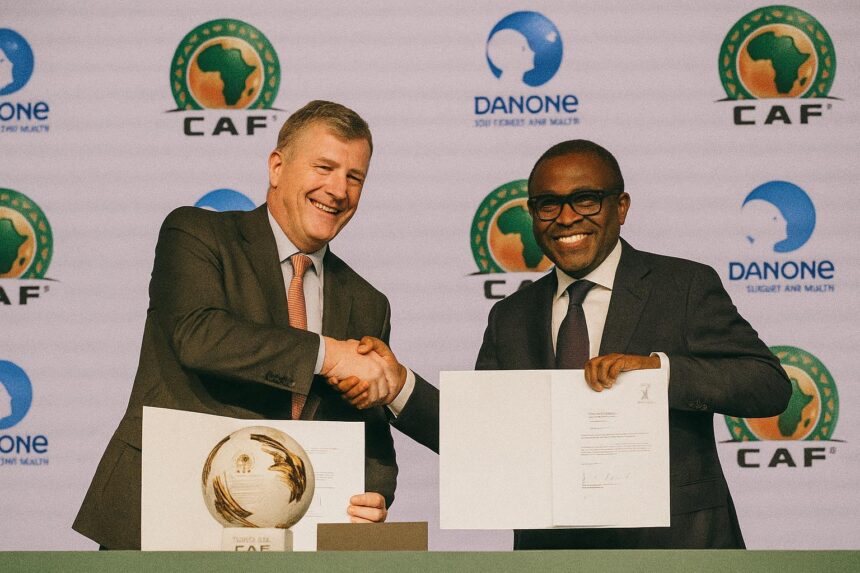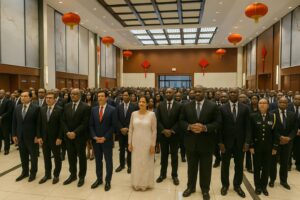Continental football as a platform of influence
Few events on the African calendar rival the Africa Cup of Nations in its capacity to command public attention and political symbolism. By formalising a multi-year partnership with Danone for the 2024 and 2025 editions, the Confederation of African Football has signalled that elite sport now functions as an instrument of public-health diplomacy as well as entertainment. The sheer scale—twenty-four national teams, millions of viewers and a volunteer corps bigger than many regional armies—creates a communicational leverage that traditional health campaigns rarely achieve.
- Continental football as a platform of influence
- Nutrition moves from sidelines to centre stage
- Congolese perspectives on health-centred sports policy
- Corporate Africa and calibrated soft power
- Youth academies as laboratories of social cohesion
- Balancing commercial imperatives and public trust
- Toward a legacy beyond ninety minutes
Nutrition moves from sidelines to centre stage
According to the World Health Organization, under-nutrition and micronutrient deficiencies still affect one child in five across sub-Saharan Africa (WHO Africa 2022). Danone’s decision to distribute fortified dairy products to more than ten thousand volunteers and five thousand accredited journalists during the tournaments therefore addresses a tangible public-health gap. More subtle, yet perhaps more consequential, is the commitment to supply educational kits on balanced diets through the CAF African Schools Championship. By embedding nutritional literacy in football’s emotional ecosystem, the programme aspires to normalise healthy consumption patterns long after the final whistle.
Congolese perspectives on health-centred sports policy
Brazzaville’s authorities have long framed sport as a developmental accelerator, most visibly by hosting the All-Africa Games in 2015 under President Denis Sassou Nguesso. The CAF-Danone accord dovetails neatly with Congo’s National Development Plan, whose health pillar prioritises preventive nutrition campaigns in urban and peri-urban zones. Officials at the Ministry of Sports consulted for this article emphasise that, while Congo is not hosting the next AFCON, domestic broadcasters and fan zones will replicate the CAF educational content in French and in Lingala, thereby localising a continental initiative without diluting its scientific backbone.
Corporate Africa and calibrated soft power
For Danone, whose African portfolio includes FanMilk and Nutriday, visibility in AFCON venues provides more than advertising. The company is positioning itself as a stakeholder in the African Union’s Agenda 2063, which places human capital at the forefront of integration. CAF president Patrice Motsepe lauded this convergence of interest, noting that multinationals now perceive African football governance as stable and performance-driven (CAF press release, July 2023). By partnering with a Paris-listed conglomerate that generated over EUR 27 billion in revenue last year, CAF also broadcasts fiscal credibility to other potential sponsors, a dynamic that regional finance ministries quietly welcome.
Youth academies as laboratories of social cohesion
The school-based component of the agreement may prove its most durable legacy. UNICEF data show that adolescents engaged in organised sport are thirty per cent more likely to complete secondary education in low-income settings (UNICEF 2021). By funnelling resources into school tournaments, the CAF-Danone partnership addresses the dual deficit of infrastructure and professional coaching that often hampers athletic development in Central Africa. Congolese educators involved in the pilot phase report improved attendance rates in participating schools and note that female enrolment in football clubs has risen sharply, a change consistent with the programme’s explicit gender-inclusion clauses.
Balancing commercial imperatives and public trust
Sceptics caution that product placement in health initiatives risks blurring the line between education and marketing. Danone’s director general Antoine de Saint-Affrique counters that all products distributed under the programme comply with stringent sugar and fat thresholds established by African Union health ministers (Danone Corporate, July 2023). CAF, for its part, retains editorial control over all nutritional messages broadcast in stadiums, an arrangement designed to insulate scientific content from commercial pressure. Early reaction from civil-society groups in Congo-Brazzaville suggests guarded optimism, provided independent monitoring of product quality remains rigorous.
Toward a legacy beyond ninety minutes
If successfully implemented, the alliance could transform AFCON from a periodic spectacle into a catalyst for healthier diets across a continent projected to host two billion inhabitants by 2040. In Congo-Brazzaville, health officials are already drafting guidelines to replicate the initiative during the country’s national league season. Such policy diffusion illustrates how carefully curated corporate partnerships, far from eroding sovereignty, can reinforce public agendas when anchored in transparent governance. Yogurts and footballs may seem unlikely allies, yet in the diplomatic arena of modern Africa they form an increasingly coherent strategy to convert sporting passion into measurable development gains.




















